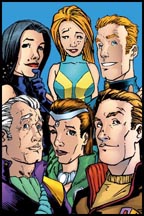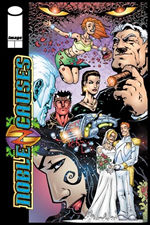>> Comment: Appointments With Disappointment
>> Comment: Accentuate The Positive?
More...

Dedication to any cause is a devalued concept in modern society. So when somebody cares about something enough to put their neck on the block among colleagues, it's a pleasant surprise.
"I once talked my pal Brian Vaughan into giving GENERAL HOSPITAL a shot," says Jay Faerber. "He had a day job at the time, and it was the kind of set-up where he was able to watch TV for most of the day. I remember him talking about the first episode he watched, how it appears at first that all the various stories are unconnected, but then, suddenly, a character from one subplot will suddenly show up with characters from another."
His outreach wasn't all that successful though. "Vaughan didn't stick with it. I'm not even sure he lasted a week."
Ever since high school, Jay Faerber has shown a dedication to his chosen field, "I've been into comics for as long as I can remember," Faerber says. "I spent a lot of my youth writing and drawing my own little comics - I have 50 issues of TEAM SUPREME, which was a rip-off of whatever team book I was enjoying at the time." After being exposed to the SPENSER novels of Robert B Parker, Faerber developed a taste for prose writing that would stay with him through the rest of his education.
Originally training to be an artist, he quickly switched to Creative Writing. "My art professor told me that if I really wanted to draw comics, I was going to have to first learn how to draw," Faerber admits. "I still think I've got some raw talent, but I lack the discipline to spend hours and hours on a single page. I want to move faster!"
Meeting the same problems as most potential comics writers, Faerber was unable to find a lecturer who had any idea how to train for such a career. Instead, he pursued his interest in crime novels and graduated with a BA in English. Moving to Seattle, he worked numerous jobs including Corporate Security for a large bank; "That was a great job, I got lots of inside info into bank robberies."
 So how did he eventually break through? "I had met Devin Grayson, months before she broke into DC. Seeing her really making a go of the comic book-thing got me inspired," explains Faerber. "I put the mystery novel I'd been writing on hold, and focused on comics. It took about two years, all told, but I managed to break into Marvel and DC at almost the exact same time." Devin helped Faerber get his first script sale from Eddie Berganza at DC and then Frank Pittarese offered him the final issue of WHAT IF...?
So how did he eventually break through? "I had met Devin Grayson, months before she broke into DC. Seeing her really making a go of the comic book-thing got me inspired," explains Faerber. "I put the mystery novel I'd been writing on hold, and focused on comics. It took about two years, all told, but I managed to break into Marvel and DC at almost the exact same time." Devin helped Faerber get his first script sale from Eddie Berganza at DC and then Frank Pittarese offered him the final issue of WHAT IF...?
After that, Faerber set himself up as the go-to man for teenage super-heroes. Working on GENERATION X and NEW WARRIORS for Marvel and TITANS for DC may have inadvertently pigeonholed him, but it was a distinction he admits he brought on himself. "I eagerly lapped up all the team books I was offered, so it's not like I have anyone to blame but myself," Faerber admits. "It has hindered my career in that I was never really offered any crime material, except for a ten-page Jason Bard story in THE BATMAN CHRONICLES, which is one of my favourites."
There was always the worry for Faerber that continuing to follow his heart - especially his love of soap opera - could make matters worse. "It's a risky game, because soaps carry just as much a stigma as comics," says Faerber. "Comic fans, strangely enough, can be kind of snooty and judgmental against other forms of entertainment. I think it may be because we, on a whole, are so often judged for our habit of reading comics."
But the reality is that comics and soaps share more than either set of fans often realise, "Both have vast continuity to draw from, and, like comics, different soaps handle it in different ways," Faerber explains. "Some soaps don't really acknowledge their distant past, in an effort to keep things fresh and accessible. Other soaps resurrect - sometimes literally - old characters, and draw heavily from old stories."
Valuable lessons can also be learnt from how soaps operate on a creative level, too. "I remember my old editor on GENERATION X, Frank Pittarese, telling me that Bob Harras used to show ALL MY CHILDREN scripts to writers, as an example of how to get across exposition pretty easily, since the soaps are expert at that." Though for his latest work, NOBLE CAUSES, Faerber makes the following disclaimer: "I don't want comics fans thinking NOBLE CAUSES is just going to be women pushing one another into pools."
 NOBLE CAUSES is Faerber's first creator-owned title, published bimonthly from Image Comics, with art by Patrick Gleason. The title tells of a superhero family more interested in its public image than in saving the world. It's a superhero soap - the Kennedys with post-human powers, as the advertising puts it. (Visit NoblesWatch for more information). The series is a combination of a lot of Faerber's interests, "It's a soap opera about people with super-powers. So it feels like a soap, yet has the added benefit of cool special effects and visuals."
NOBLE CAUSES is Faerber's first creator-owned title, published bimonthly from Image Comics, with art by Patrick Gleason. The title tells of a superhero family more interested in its public image than in saving the world. It's a superhero soap - the Kennedys with post-human powers, as the advertising puts it. (Visit NoblesWatch for more information). The series is a combination of a lot of Faerber's interests, "It's a soap opera about people with super-powers. So it feels like a soap, yet has the added benefit of cool special effects and visuals."
Not only is Faerber forging into new territory creatively, he's also discovering new ways of working, "Doing stuff at Image has its own share of headaches, and that's not a jab at Image. I just mean that there's no editor to hold your hand. You're on your own. And some of my Marvel and DC freelancer pals, who've never created anywhere else, can't believe all the stuff I'm responsible for." Faerber explains. "At the end of the day, though... It's still worth it."
"When I decided to pitch something to Image, I wanted it to be something I wouldn't get tired of and something different," says Faerber. "I've always wanted to do a soap opera series with super-hero trappings. Back when Frank Pittarese was an editor at Marvel, I tried to get him to help me develop a soap opera in the Marvel Universe." Faerber's attempts to produce work outside the superhero bracket would have to wait though, "Frank didn't think it would fly at Marvel, and considering the climate back then, he was probably right."
Looking back at his Marvel work, Faerber says, "On NEW WARRIORS, I just plain wasn't ready. I didn't have the chops to do the book and its characters justice." Faerber admits that working on childhood favourites is sometimes a mixed blessing, "On TITANS, my editor and I never really saw eye-to-eye. He had no interest in - or familiarity with - the book before he was asked to edit it, so we were really coming at it from opposite ends."
Resigning from TITANS leaves Faerber almost fully free to control his own publishing destiny. NOBLE CAUSES being the lynchpin of this move.
Faerber explains, "It's merely the first step in getting the average comic reader to read more than just super-heroes. The average comic reader probably isn't interested in a straight crime comic, but chances are good he'd buy a crime comic about super-heroes."
This halfway house approach to introducing new genres to the staid comic mainstream is something Faerber believes in fully, "When I was on GENERATION X, I really wanted to shake the book up, and get rid of some characters, and really overhaul it. I was never allowed to, though, as Marvel was all about keeping the status quo."
 Faerber is also careful not to put all his eggs in one basket. "I moved to Hollywood about six months ago, for the express purpose of breaking into screenwriting. It's long been an ambition of mine," says Faerber. "I'm shopping around my spec scripts and continuing to make contacts. And I'd very much like to write a novel one day as well. I'm a big mystery fan, and my ultimate plan is to use the money I'll make from screenwriting to be able to take a year off and concentrate on nothing but the novel."
Faerber is also careful not to put all his eggs in one basket. "I moved to Hollywood about six months ago, for the express purpose of breaking into screenwriting. It's long been an ambition of mine," says Faerber. "I'm shopping around my spec scripts and continuing to make contacts. And I'd very much like to write a novel one day as well. I'm a big mystery fan, and my ultimate plan is to use the money I'll make from screenwriting to be able to take a year off and concentrate on nothing but the novel."
The television rights to NOBLE CAUSES were snapped up before the series even hit the shelf, giving Faerber an in-road to creating the type of show that really speaks to him. "I'm a sucker for PI stories, and TV hasn't had a good PI show since MAGNUM PI got cancelled," claims Faerber. "I'd love to do something like that. Something that mixes its easy charm and wit with solid crime stories."
He's not resting on his laurels though. While bringing soap-operas to the comics mainstream, Faerber is planning his second creator-owned title, a straight crime comic. "The best way to describe it would be; THE ROCKFORD FILES for the 21st Century.
"While I think it's great that there are more and more crime books popping up, I don't think all crime books necessarily need to be bleak, grim stories. ... DODGE'S BULLETS - about Seattle private eye Webster Dodge - will be a bit lighter in tone. Lots of sarcasm and self-deprecating humour, along with a good mystery story that subverts a lot of the PI conventions."
With other upcoming work in fields as varied as crime, fantasy, science-fiction and super-heros, the only element that links them is that Faerber will be solely responsible for them. "I spent 1998-2001 really throwing myself into the work-for-hire super-hero stuff, but I'm now concentrating almost exclusively on projects from publishers other than Marvel and DC," says Faerber. "I think 2002 will be a very big year for me."

This article is Ideological Freeware. The author grants permission for its reproduction and redistribution by private individuals on condition that the author and source of the article are clearly shown, no charge is made, and the whole article is reproduced intact, including this notice.


